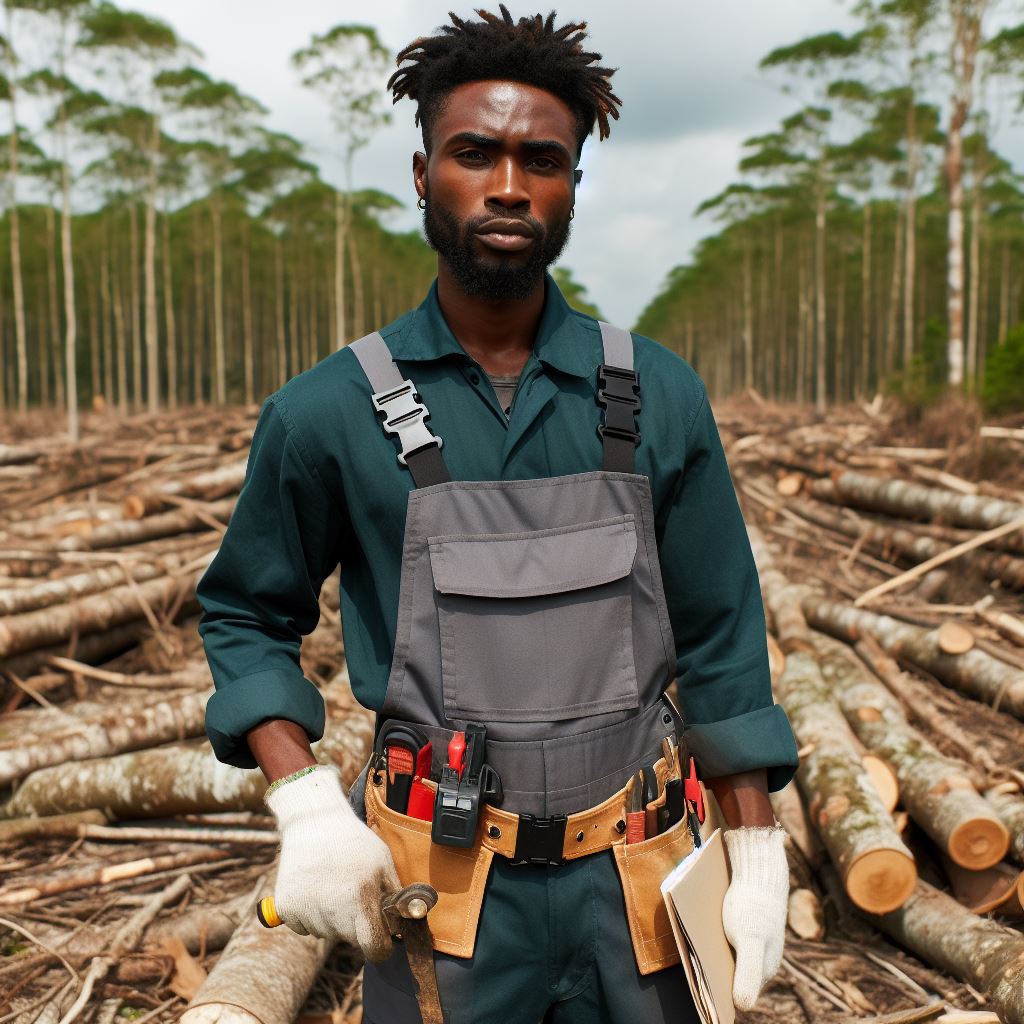Introduction
Nigeria, a country teeming with ecological diversity, boasts a rich tapestry of flora and fauna.
From the lush rainforests of the south to the arid landscapes of the north, the nation’s biodiversity is a testament to its ecological significance.
However, this treasure trove faces escalating threats from deforestation, climate change, and human activities.
The urgency to safeguard this wealth of life has never been more pressing.
At the forefront of biodiversity conservation stands forestry, a linchpin in the delicate balance between nature and human development.
Forests, acting as sanctuaries for countless species, play a pivotal role in maintaining ecological equilibrium.
Not only do they provide habitats for diverse flora and fauna, but they also contribute to climate regulation, water purification, and soil fertility.
The intricate web of life intricately woven within the forest canopy is a testament to the symbiotic relationship between forestry and biodiversity.
The purpose of this blog post is to delve into the symbiotic alliance between forestry and Nigerian biodiversity conservation.
As we stand at the crossroads of environmental stewardship, understanding the profound impact of forestry practices on the preservation of our natural heritage becomes imperative.
This exploration aims to unravel the intricacies of how forestry, when managed sustainably, can act as a bulwark against the tide of biodiversity loss.
By examining the interplay of these elements, we hope to shed light on actionable steps for safeguarding Nigeria’s diverse ecosystems.
Overview of Nigerian Biodiversity
Description of Nigeria’s diverse ecosystems and species
- Nigeria is a country located in West Africa with a rich and diverse array of ecosystems.
- The country encompasses different types of ecosystems including forests, savannahs, wetlands, and coastal areas.
- These ecosystems support a wide variety of plant and animal species, ranging from tropical rainforests to desert-adapted species.
- The Nigerian forests are known for their unique flora and fauna, with many species found nowhere else in the world.
- In the southwestern region, the Nigerian montane forests harbor endemic species such as the Nigeria-Cameroon chimpanzee and drill monkey.
- The northern Guinea savanna in Nigeria is home to iconic species like elephants, giraffes, and lions.
- Wetlands, such as the Niger Delta, provide critical habitats for multiple migratory bird species.
- Nigeria’s coastal areas are rich in marine biodiversity, with coral reefs, seagrass meadows, and mangrove forests supporting diverse species.
- Overall, Nigeria’s ecosystems and species contribute significantly to the country’s natural heritage.
The significance of Nigerian biodiversity globally
- Nigerian biodiversity is not only important within the country but also globally.
- The country’s rich biodiversity contributes to global ecological balance and resilience.
- Many of the species found in Nigeria are of high conservation value and are considered globally threatened or endangered.
- Preserving Nigerian biodiversity is crucial for maintaining the overall global biodiversity hotspot status.
- Conserving Nigeria’s biodiversity can contribute to achieving internationally agreed upon conservation targets, such as those set by the Convention on Biological Diversity.
- Many medicinal plants and traditional knowledge associated with Nigerian biodiversity have global importance in healthcare and pharmaceutical industries.
- Nigeria’s diverse ecosystems provide ecosystem services like clean water and air, carbon sequestration, and soil fertility.
- Loss of Nigerian biodiversity can have negative impacts on the global climate, as healthy ecosystems contribute to climate regulation.
- International collaboration and partnerships are essential for protecting Nigerian biodiversity and ensuring its global significance.
- Responsibly managing and utilizing Nigeria’s natural resources can promote sustainable development while conserving biodiversity.
Read: Community Involvement and Participation in Forestry Projects in Nigeria
Importance of Biodiversity Conservation
The Benefits of Biodiversity to Society, Economy, and Ecosystems
Biodiversity, the variety of life on Earth, is the cornerstone of ecological balance, providing essential services to both society and the economy.
In Nigeria, a nation endowed with rich biodiversity, this interconnected web of life plays a crucial role in sustaining human livelihoods.
The diverse ecosystems, from lush rainforests to savannas, house a plethora of plant and animal species, many of which hold immense value for medicine, agriculture, and cultural practices.
The unique flora and fauna contribute to the nation’s identity and traditional knowledge.
Economically, biodiversity is a source of livelihood for many Nigerians, particularly those in rural areas who depend on forest resources for sustenance.
Timber, non-timber forest products, and medicinal plants are essential contributors to local economies.
Additionally, ecotourism thrives on Nigeria’s diverse landscapes, attracting visitors and generating revenue that supports both local communities and national development.
The Need for Sustainable Practices to Maintain Biodiversity
However, the unchecked exploitation of forests poses a significant threat to this invaluable biodiversity.
Unsustainable logging, agricultural expansion, and infrastructure development are leading causes of habitat loss, endangering numerous plant and animal species.
To ensure the continued availability of these resources, there is a pressing need for sustainable forestry practices.
Adopting sustainable forestry practices involves careful management and conservation of ecosystems.
This includes selective logging, reforestation efforts, and community-based resource management.
Integrating indigenous knowledge with modern conservation strategies is key to striking a balance between human needs and environmental preservation.
The Threats Facing Nigerian Biodiversity
Despite the importance of biodiversity, Nigerian ecosystems face imminent threats. Climate change, deforestation, and pollution are exacerbating the vulnerability of many species.
Additionally, the illegal wildlife trade poses a severe risk to iconic species like the Nigerian chimpanzee and forest elephants.
To address these threats, collaborative efforts between government, local communities, and international organizations are imperative.
Strengthening legislation, investing in conservation education, and promoting sustainable livelihoods are essential steps toward safeguarding Nigeria’s biodiversity.
Basically, the link between forestry and Nigerian biodiversity conservation is intricate and vital.
Recognizing the importance of biodiversity, implementing sustainable practices, and addressing threats collectively will ensure the preservation of Nigeria’s rich natural heritage for future generations.
Read: The Intersection: Family Values and Consumer Behavior in Nigeria
Role of Forestry in Biodiversity Conservation
How forests contribute to biodiversity preservation
Forests play a crucial role in the preservation of biodiversity due to their rich and diverse ecosystems.
They provide habitats for numerous species, creating a diverse range of flora and fauna.
The interdependence between trees, plants, animals, and microorganisms in forests creates a delicate balance, sustaining countless species.
Forests serve as a home for a plethora of wildlife, including birds, mammals, insects, and reptiles.
The canopy of trees in forests provides shelter and nesting sites for birds, while the undergrowth provides hiding places for small mammals.
Forests also act as a buffer zone, protecting vulnerable species from external threats.
The ecosystem services provided by forests
Apart from their role in biodiversity preservation, forests offer various ecosystem services essential for maintaining global ecological balance.
Transform Your Career with Expert Guidance
Get personalized mentorship consulting that’s tailored to your unique path. Our expert advice is actionable and exclusive.
Get StartedThese services include carbon sequestration, water regulation, soil conservation, and climate regulation.
Forests act as a major carbon sink, absorbing carbon dioxide from the atmosphere, thereby mitigating climate change.
They store large amounts of carbon in their biomass, preventing it from being released into the atmosphere.
Moreover, forests play a vital role in regulating water cycles. Tree canopies intercept rainfall, reducing erosion and minimizing surface runoff.
This aids in filtering and purifying water, maintaining water quality for both people and wildlife.
Forests also contribute to soil conservation by preventing soil erosion.
The root systems of trees anchor the soil, reducing the risk of landslides and ensuring soil stability.
This is crucial for protecting valuable agricultural land and preventing desertification.
Examples of successful forest conservation initiatives in Nigeria
Nigeria has recognized the importance of forest conservation and has implemented various initiatives to preserve its rich biodiversity.
One such initiative is the Gashaka-Gumti National Park in northeastern Nigeria.
Gashaka-Gumti National Park is the largest national park in Nigeria and serves as a haven for endangered species like the Nigerian chimpanzee, African elephant, and the Nigeria-Cameroon chimpanzee.
It encompasses both montane and lowland forests, showcasing the diversity of Nigerian ecosystems.
Another example is the Omo Forest Reserve in southwestern Nigeria.
This reserve is home to a wide range of plant and animal species, including the rare white-throated monkey and the African elephant. Efforts have been made to protect and manage this reserve sustainably.
In essence, forestry plays a crucial role in the conservation of biodiversity in Nigeria. Forests contribute to biodiversity preservation by providing habitats for various species.
They also provide essential ecosystem services such as carbon sequestration, water regulation, and soil conservation.
Successful forest conservation initiatives like Gashaka-Gumti National Park and Omo Forest Reserve highlight Nigeria’s commitment to preserving its rich natural heritage.
Read: Pioneers of Family & Consumer Sciences Education in Nigeria
Challenges and Opportunities in Forest Management
The main challenges faced in maintaining healthy forests in Nigeria
- Lack of proper forest governance and weak enforcement of existing forest laws.
- Deforestation and illegal logging activities leading to loss of biodiversity and habitats.
- Unsustainable agricultural practices and expansion of farmland into forest areas.
- Climate change impacts, such as increased temperatures and changing rainfall patterns.
The need for sustainable forest management practices
- To preserve and protect the rich biodiversity found in Nigerian forests.
- To ensure the provision of ecosystem services, such as clean air, water, and carbon storage.
- To maintain the livelihoods of local communities dependent on forest resources.
- To mitigate climate change by reducing deforestation and promoting reforestation.
Opportunities for improving forest conservation efforts
- Community involvement in forest management through participatory approaches.
- Capacity building and training for forest rangers and local communities.
- Establishment of protected areas and sustainable forest management plans.
- Implementation of stronger enforcement mechanisms and penalties for illegal logging.
- Development of alternative livelihood options for forest-dependent communities.
- Policy changes to prioritize forest conservation and sustainable land use practices.
- Promotion of sustainable timber harvesting and certification schemes.
In a nutshell, maintaining healthy forests in Nigeria is crucial for biodiversity conservation and sustainable development.
The main challenges include weak governance, deforestation, unsustainable agricultural practices, and climate change impacts.
However, there are opportunities for improvement, such as community involvement, policy changes, and capacity building.
By adopting sustainable forest management practices, Nigeria can protect its unique biodiversity and ensure the well-being of both its ecosystems and local communities.
Read: Evolution of Family Sciences Curricula in Nigerian Universities

Case Studies: Forest Conservation and Biodiversity in Nigeria
Examination of specific examples where forestry practices have positively impacted Nigerian biodiversity
- The Cross River National Park is one such example, where sustainable forestry practices have helped protect endangered species.
- By implementing reduced-impact logging techniques, the park has maintained a healthy forest ecosystem and preserved species diversity.
- Efforts to control illegal logging in the park have further contributed to safeguarding biodiversity and maintaining ecosystem balance.
- The Gashaka Gumti National Park has also shown positive outcomes in terms of forest conservation and biodiversity preservation.
- Through effective forestry management, the park has been able to maintain habitats for a wide range of plant and animal species.
- The establishment of protected areas within the park has allowed endangered species such as the Nigerian chimpanzee to thrive.
- Community-based forestry initiatives in Omo Forest Reserve have successfully protected biodiversity while providing livelihood opportunities to local communities.
- Through collaborative efforts, communities have been involved in sustainable harvesting practices and monitoring of rare species.
- These practices have resulted in improved ecosystem health and the protection of endangered species.
The outcomes and lessons learned from these case studies
- The case studies highlight the significance of sustainable forestry practices in conserving Nigerian biodiversity.
- They demonstrate that effective forest management can help maintain healthy ecosystems and protect endangered species.
- Reduced-impact logging techniques prove to be a valuable approach to minimize ecological disturbance and maintain biodiversity.
- Efforts to control illegal logging are crucial in ensuring the sustainability of forests and the survival of vulnerable species.
- Establishing protected areas within forest reserves allows for the preservation of critical habitats and the restoration of endangered species.
- Community involvement in forestry initiatives promotes conservation awareness and ensures efficient resource utilization.
- It is vital to combine traditional knowledge and scientific expertise for the sustainable conservation of biodiversity.
- The successful outcomes of these case studies encourage the replication and scaling-up of similar forestry practices in Nigeria.
- Lessons learned emphasize the need for continuous monitoring, adaptive management, and stakeholder collaboration in forest conservation efforts.
You Might Also Like: Benefits of Using Drones in Livestock Monitoring
Collaboration and Stakeholder Involvement
Importance of Collaboration between Government, NGOs, Local Communities, and Other Stakeholders
Collaboration between government, NGOs, local communities, and other stakeholders is paramount for effective forestry and biodiversity conservation in Nigeria.
By joining forces, these different entities can pool their knowledge, resources, and experiences to tackle the interconnected challenges.
Firstly, collaboration allows for the exchange of diverse perspectives.
Government bodies, NGOs, and local communities each possess unique understandings and insights into the forest ecosystems and the communities that depend on them.
By working together, they can harness these perspectives to develop more comprehensive and sustainable forest management plans.
Additionally, collaboration enables the sharing of resources.
While government agencies may have access to funding and policy-making capacities, NGOs often possess technical expertise and community networks.
Local communities, on the other hand, possess traditional knowledge and a deep understanding of their local environment.
Through collaboration, these resources can be combined to create holistic approaches that benefit both conservation efforts and the livelihoods of local communities.
Furthermore, collaboration enhances the effectiveness of on-the-ground conservation efforts.
Governments may have the regulatory power to enforce environmental laws, but they often lack the capacity to monitor vast forest areas effectively.
By involving NGOs and local communities in monitoring and enforcement, compliance with conservation measures can be improved, reducing illegal activities like deforestation and wildlife poaching.
Collaboration also fosters a sense of ownership and participation among stakeholders.
When different actors actively work together towards a common goal, they develop a sense of shared responsibility for the forests and biodiversity.
This collective ownership motivates all stakeholders to contribute their best efforts and resources to ensure the long-term conservation and sustainable management of Nigeria’s forests.
The Role of Education and Awareness Campaigns in Engaging Communities for Forest Conservation and Biodiversity Protection
Education and awareness campaigns are powerful tools for engaging communities and fostering a sense of responsibility towards forest conservation and biodiversity protection.
Firstly, education provides communities with crucial knowledge about the value of forests and the importance of biodiversity.
It helps them understand how their actions can impact these ecosystems and the wider implications for their own well-being.
By imparting this knowledge, communities are more likely to adopt sustainable practices and actively participate in conservation efforts.
Awareness campaigns are equally important as they help mobilize communities and create a sense of urgency.
Through targeted messaging and advocacy efforts, campaigns can raise awareness about the threats facing forests and biodiversity, such as deforestation, habitat loss, and climate change.
This increased awareness prompts communities to take action and demand stronger environmental policies and regulations.
Moreover, education and awareness campaigns can empower local communities to become advocates for forest conservation.
By providing them with the necessary tools and information, communities can play an active role in monitoring and protecting their local forests.
This bottom-up approach not only strengthens the impact of conservation initiatives but also ensures long-term sustainability by fostering community-led solutions.
Additionally, education and awareness can lead to economic opportunities.
By equipping communities with knowledge on sustainable forest management and biodiversity conservation, they can explore eco-tourism, agroforestry, and other nature-based enterprises.
These alternative livelihood options reduce the reliance on activities that harm forests and biodiversity, offering communities a way to generate income while promoting conservation.
Overall, collaboration and stakeholder involvement, combined with effective education and awareness campaigns, are crucial to successfully link forestry and Nigerian biodiversity conservation.
By bringing together different actors and empowering communities, Nigeria can foster a culture of conservation that ensures the sustainable management and protection of its rich biodiversity and forests for future generations.
Conclusion
In this post, we have explored the intricate connection between forestry and Nigerian biodiversity conservation.
We have learned that forests play a crucial role in maintaining the country’s rich and diverse ecosystems.
Forests in Nigeria provide habitats for a wide variety of plant and animal species, many of which are endemic and endangered.
They also contribute to the regulation of climate and water cycles, soil conservation, and the provision of ecosystem services.
Furthermore, we have discovered that sustainable forest management is essential for preserving biodiversity in Nigeria.
This involves implementing practices that promote the regeneration of forests, protecting threatened species, and preventing deforestation.
To ensure the preservation of Nigeria’s biodiversity, it is crucial for both the government and individuals to take action.
We must prioritize sustainable forest management, which includes adopting responsible logging practices, promoting afforestation and reforestation initiatives, and enforcing strict laws against illegal logging.
In addition, education and awareness campaigns can play a vital role in raising public consciousness about the importance of preserving biodiversity and the role of forests in achieving that.
By empowering local communities and involving them in conservation efforts, we can create a strong network of stewards for our forests.
It is only through collective efforts that we can protect the natural heritage of Nigeria and pass it on to future generations.
Let us take action now to ensure the sustainable management of our forests and the preservation of our precious biodiversity.




